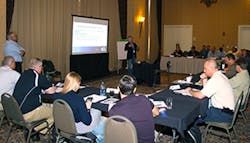Latest from Training
Sponsored
Implementing what you learn at a training event can be a real challenge. Let’s take a look at how to multiply the value of your training by sharing what you learned with others in your company.
Retraining
How often have you been trained, or sent someone to a training event, but then continued doing business as usual when you or they return home?
If training hasn't made some change in your company, it didn't work.
The good news is that you can very simply multiply the value of training by many times its original cost by establishing the practice of “retraining.” The general idea is that those who go to a training event return to the shop or office and teach what they learned.
The following steps can be put in place to enhance the learning process and transfer knowledge to others in your company. You will begin to see that small changes can make a huge difference.
Think about this: If you knew beforehand that you would have to teach what your learned from attending a show conference, would it change how you pay attention?
Require the Student to Become the Teacher
Prior to sending someone to training, create the expectation that they are to return and teach what they learned to their peers in the company. This assignment should take less than 10 minutes to deliver, but has many far-reaching benefits for the student and the company.
Consider carefully who should attend outside training. Ask yourself: Who are the individuals with the most interest in the subject? Who can return and teach the best of what they learned at the event? Who will be most affected by what is to be taught?
Consider yourself attending training with that assignment. It changes everything, doesn't it?
It not only increases the obligation of the person to learn, but it automatically increases their attention to and retention of the material presented. A new sense of importance is achieved, and the learning process is greatly enhanced.
When the team member returns and teaches what he or she learned to fellow employees, it builds unity and goodwill and strengthens the company.
Accountability
I can’t tell you how many times I’ve heard contractors say they come back from a training event all fired up and committed to implementing what they learned. On their first day back, they find four employee emergencies and seventeen urgent messages and they quickly lose sight of their commitment and goals as they fall back into each day's demands.
Attend external training with a highlighter and the assignment to return to your business and teach your team what you learned.
By creating a retraining requirement, you can alleviate this scenario. An assignment to teach what was learned must have accountability tied to it. An example assignment to an employee could be: "After you receive this training in air diagnostics, will you identify four short lessons and share this them with your team from 7:30 to 8:15 each Friday morning for the next four weeks?"
Such an assignment, if carried out, can help solidify what they learned and help implement it to the benefit of the company for many years to come.
Although many of us aren't eager to get up in front of the rest of our department and become the instructor, it is a noble effort that can make a person more than what he or she was before. Many people find great satisfaction after the experience is over, and their reputation in the company increases.
Preparation Time
So be sure to you and your people attend any training event with a highlighting pen and an assignment to return and teach. Most training companies are eager to allow you to use their materials to instruct fellow employees. I would question a training company that won’t allow their materials to be used for this purpose. Most materials are part of your cost and permission to reuse them for your company is normally granted.
Preparation to teach others when returning home can actually take place during the outside training event. As specific principles are taught that interest the student, they can create the lesson outline right in the training materials by highlighting and making notes in the margins.
Choose Training with a Purpose
Those companies that consistently improve employee skills through training are either at the top of their marketplace or are headed that way. It shows up in enthusiasm, effectiveness, and on the bottom line. Nothing motivates like new knowledge. When an employee is not learning, he or she is going backwards. All companies, sooner or later, follow the direction of its employees.
In selecting the training that will most benefit your company, ask yourself the following questions:
• What do we expect to gain from the training?
• Which person in your company is most able to attend the training and implement what was learned?
• Can the company soon begin to apply and profit from what was learned?
• Do the authors of the training understand the HVAC industry enough to prepare information that relates directly to your needs?
• Is there a financial gain from the training and will covers the cost of training in the next 90 days?
• Is this real training that will benefit your company, or is it just a cheerleading session?
• What related types of training may be available?
• Is certification available from the training?
• What other effort and expenses will be required before you can implement what you are being trained to do?
These are terrific questions to ask as you make buy decisions for training. These questions can also be discussed in advance with those attending the training to help them understand their obligations.
With this in mind, as you look to the future, become intentional about the outcome of the training you buy. Multiply the value of your training by assigning those you send to return and retrain others in the company. Remember: If training doesn’t create some change in your company, it didn't work.
Rob “Doc” Falke serves the industry as president of National Comfort Institute (NCI) -- an HVAC-based training company and membership organization. If you're an HVAC contractor or technician interested in a free training workbook on How to Measure Static Pressure, contact Doc at [email protected] or call him at 800-633-7058. Go to NCI’s website at nationalcomfortinstitute.com for free information, articles, and self-training downloads.




